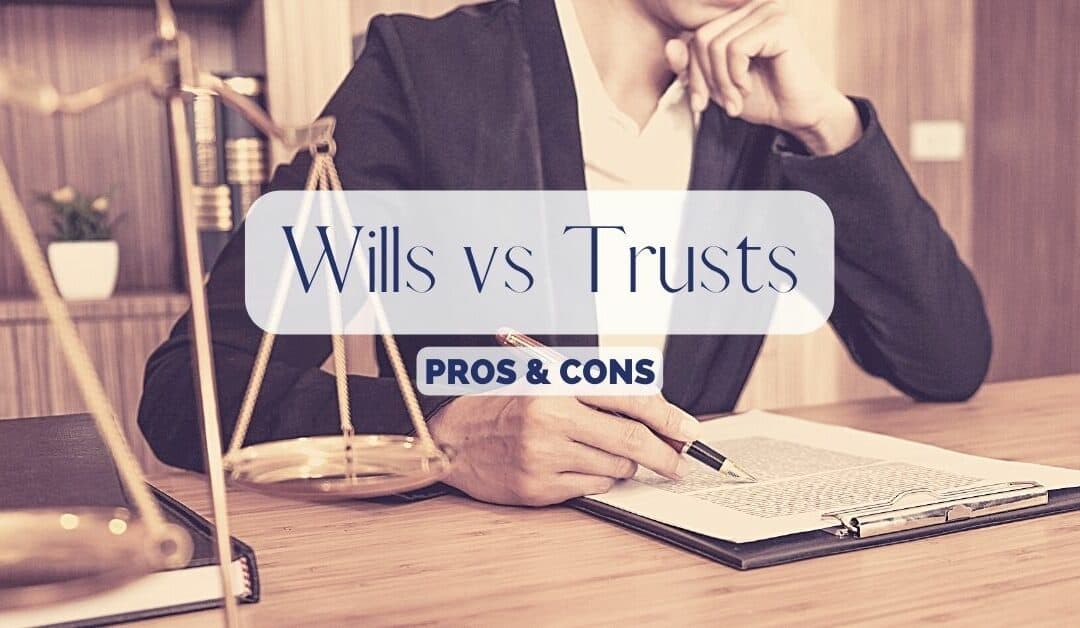When it comes to estate planning, there are a few different options to choose from. Some of the most popular legal tools include wills and trusts. Both have their own pros and cons, making it difficult to decide which one is right for you. If you’re confused about the differences, you’re in good company. Let’s explore wills vs trusts pros and cons in detail so you can make an informed decision about what is best for your needs.
Wills vs Trusts: Pros and Cons
Avoid Court-Ordered Guardianship of Your Assets While Living
What if you have a major medical event and cannot manage your finances independently? A trust lets you choose someone you trust to manage your assets if you become incompetent or incapacitated.
Your will can’t help you while you are still living- it only goes into effect after your death. Without choosing someone to manage your affairs if needed, a court’s discretion determines your situation. A judge will likely order guardianship with someone you have no power to choose.
Avoid Probate Court For Your Family After Your Death
A trust can also help you avoid probate court. Any assets placed in your living trust do not go through probate or face the public’s prying eyes.
Assets left out of your trust DO go through probate, whether you have a will or not. However, with a pour-over will, the remaining assets of your estate automatically go into your trust at death. As long as you write a pour-over will, your trust will keep the entirety of your estate out of probate.
Probate is the lengthy and costly court-ordered process of settling your estate involving:
- Paying your bills, taxes, creditors
- Paying your estate and income tax
- Distributing all assets to your heirs
When your assets are in trust, the trustee you choose oversees paying creditors and distributing your assets.
Keep Your Privacy
Probate is public, and heirs know what everyone else inherits. With a will, you always go through probate court unless your estate is worth less than $20,000 as a single person ($30,000 for a couple).
The public nature of probate can bring fraudulent creditors looking for a payout. Even those with a legitimate claim on your estate may bill for more since the estate administrator may not know of their fraudulent activity.
Avoid Medicaid Recovery in North Carolina
In addition, if you accept Medicaid payments during your lifetime for long-term care, the state of NC can send a substantial bill to your estate. As a creditor on your estate, they can charge for the care they paid for during your lifetime. Medicaid recovery demands can mean your family needs to sell your home to pay off your long-term care expenses. Certain trusts can prevent your estate from ever receiving this bill!
Draining Your Estate Assets in Court Battles
The public nature of probate can also bring on family disputes that can tie your estate up in court for years! If your niece is jealous of her cousin’s inheritance, she can repeatedly sue until she exhausts the funds in your estate coffers.
However, with a trust, you can avoid probate altogether. Instead, the trustee you choose distributes assets and settles your estate without court interference. Those looking for a quick payout are not quick to fight trust documents in court since they never see them in the first place.
Wills vs Trusts: Why Write a Last Will & Testament?
When you draw up a trust with an experienced estate planning attorney, they will also recommend writing a will. However limited it may be, your will remains an integral part of your estate plan.
Your will is crucial in naming a guardian for any children under 18. You leave their care up in the air should you and the other parent pass away without doing so. Without asking someone to take this position, you leave the court to decide who will care for your children.
Sadly, many children end up in foster care when a simple question to a close friend and writing a will could have prevented a foster care situation.
Benefits of a Trust
Both wills and trusts allow you to name beneficiaries for your assets. However, trusts can provide potential benefits that wills do not. Depending on the type of trust you open with your attorney, a trust can prevent a lost inheritance by protecting it from:
- Creditors
- Divorce
- Addictions such as drugs, spending, or gambling
- Car accidents lawsuits or other civil suits
- Bankruptcy
- Business loss
As legal tools for estate planning go, trusts and wills are both crucial for an estate plan. However, with a pour-over will pouring all of your assets into your trust at your death, a trust may maximize your estate value. Your estate assets can best avoid future loss and pass a legacy to your heirs using trust documents.
We Can Help
At Cape Fear Law, we consider your unique situation before working with you to draw up estate plans. There are many types of trusts, so we consider the most appropriate type of trust for your specific needs. Contact us to discuss your goals and concerns about your estate’s future and find solutions to safeguard your estate. Protect your life here and now and your legacy to your heirs in the future. Call us today to get started!

